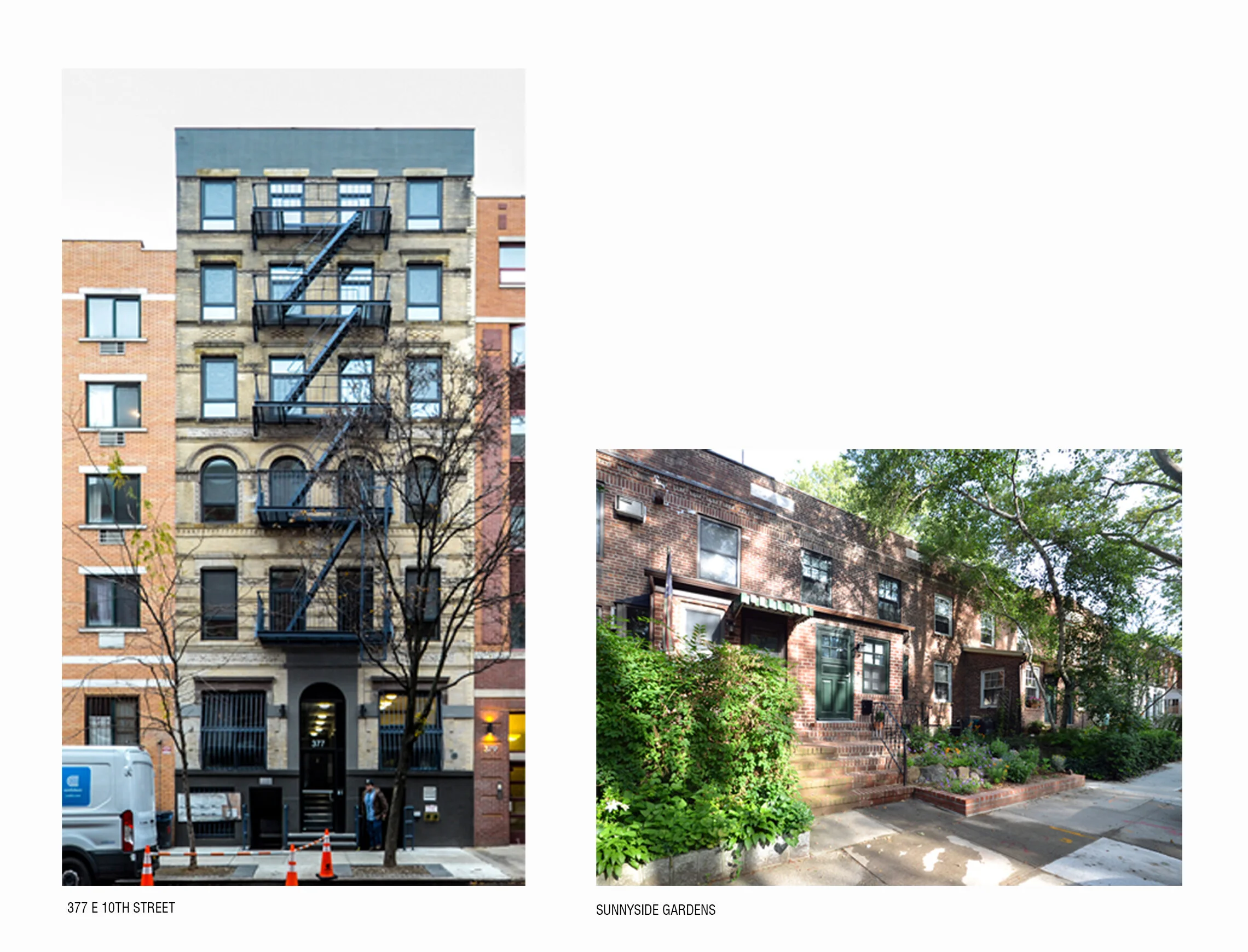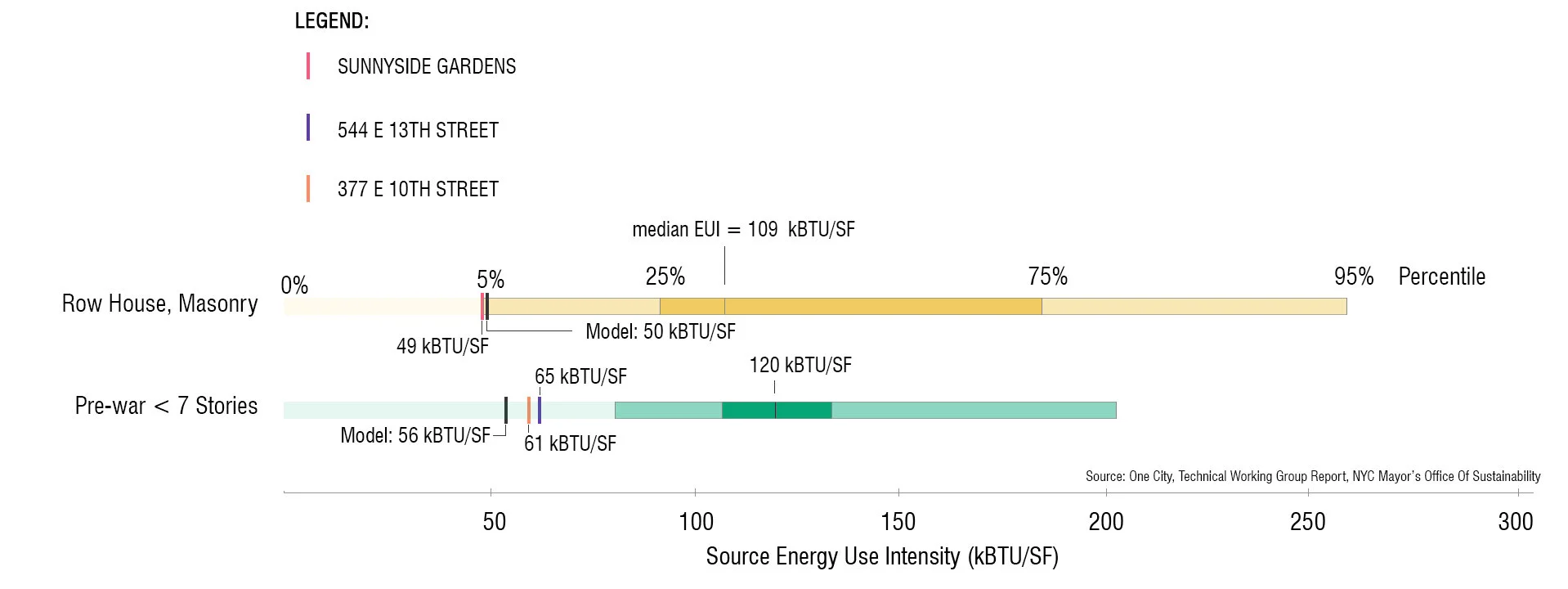New York City’s New Carbon Taxes for Buildings
COVID-19 Mitigation Strategies for Building
We are pleased to share our benchmarked data that puts our retrofit building’s energy performance within the top 5% in the city for its energy use.
We present three of our completed retrofit projects, two-six story affordable co-op multifamily buildings on Manhattan’s Lower East Side, and a historic row-house in the Sunnyside Gardens Historic District. The benchmarked data also validates Passive House (PH) strategies as cost-effective to retrofit homes. Our extensive early energy modeling in the design phase is shown to be accurate, supportive of early decision making, and minimizes budget increases.
Energy Benchmarking is a methodology to determine the annual energy use of a building. Based on our data, we can make several conclusions. First, passive house energy software is good at predicting energy use for buildings and is an excellent tool to optimize building design. Second, the (PH) methodology is cost-effective at substantially reducing the energy consumption of a building, even when not PH certified.
The three completed projects by Paul A. Castrucci Architects are 544 E 13th Street and 377 E 10th Street, two multifamily projects with over 10,000 SF located in NYC’s Lower East Side, and Sunnyside Gardens, a 1,000 SF row-house in the historic district of Sunnyside, Queens, NY. All three projects are retrofits using the PH methodology.
The multifamily buildings and row-houses' energy performance are within the top 5% for their building type and occupancy for New York City, as seen in the graphic below. The Energy Use Intensity (EUI) - total annual energy use divided by gross areas (kBTU/SF) - is approximately half of the median EUI for the building types and occupancies.
Comparing benchmarked energy use with the modeled energy use shows they are within 15% for the multifamily buildings and 2% of the actual energy demand for the row-house. Occupant behavior is challenging to model, which may explain the model's discrepancy between modeled and actual energy use for the multifamily. Still, we find the model a useful tool for all three projects. Especially for low-income housing, using whole-building energy modeling to optimize design decisions can help clients save on their energy bills while limiting budget increases on the project. Furthermore, PH design increases resilience to power failure, and provides a healthier and more comfortable indoor environment - attributes that are invaluable for homeowners.
Benchmarking is an essential tool for helping PCA gauge the intended energy performance for a building. It also helps fine-tune our in-house energy modeling methodologies.
Source energy use intensity (kBTU/SF) modeled, monitored and median for NYC.
To help reach New York City's climate goals, the City has adopted regulations that include introducing energy benchmarking and carbon TAX (known as Local Law 97) starting 2024 for owners of large buildings. The city carbon TAX is $268 per metric carbon ton over carbon limits.
Paul A. Castrucci Architects (PCA) is an integrated Architectural and Energy consulting Firm. We design and retrofit buildings to achieve low energy that meets Local Law 97 (LL 97) using the cost-effective PH methodology. The cost savings owners get from their utility bill, and avoiding LL 97 fines makes energy upgrades a substantial investment. Owners can take advantage of the Property Assessed Clean Energy Financing (PACE) financing that offers superior interest loans with better terms offered to NYC building owners for energy retrofits.
PCA provides comprehensive services for owners to meet LL 97 compliance. We Energy Benchmark buildings as per LL 84, 133, and 33. We craft plans for owners on ways to meet LL 97 and avoid expected carbon TAX. Our assessment for building owners may qualify for up to 50% cost-sharing provided by the New York State Energy Research and Development Authority (NYSERDA).
Along with energy benchmarking, our consultants will perform an energy audit to identify critical building systems, its efficiency through inspection and testing. The energy benchmark, energy audit, and energy modeling will help us develop the best strategies to meet LL 97 for building owners.
To find out more about our architectural and energy services for your building, please reach out to Paul or Grayson at [email protected] or call us at 212-254-7060.
Finally, our design service via the PH methodology provides a healthier built environment in the age of COVID-19. Existing buildings owners should consider changing their mechanical ventilation settings to increase ventilation and filters to reduce the viral load of the coronavirus indoors. If you want to learn more about how COVID-19 can be transferred in the built environment, please reach out to Paul or Grayson at [email protected] or call us at 212-254-7060.

